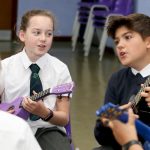Pupil Premium
 In 2011-12 the Government launched its Pupil Premium funding. This money is sent to schools based on the numbers of pupils in the school who are eligible for Free School Meals (FSM). From 2012-13, it has been expanded to include all children who have been eligible for FSM within the last 6 years.
In 2011-12 the Government launched its Pupil Premium funding. This money is sent to schools based on the numbers of pupils in the school who are eligible for Free School Meals (FSM). From 2012-13, it has been expanded to include all children who have been eligible for FSM within the last 6 years.
This money is allocated to initiatives to ensure pupils reach their full potential, both academically and socially.
In 2019 – 2020 £28,020, 2020 – 2021 £24,865 , £26,210 in 2021 – 2022, £25,595 in 2022 – 2023 and £29,795 in 2023 – 2024
This money is used to help provide for the following initiatives:-
| Spent on | Main barriers to learning/Aim of support given |
| Learning Mentor (£21,045) | To support pupils’ self-esteem, attitudes to learning. |
| Learning Support Assistant one to one or small group support (Part of £21,045) | To help children reach their full potential in Maths and English. |
| One to One Tuition (£6,750) | To help children reach their full potential in Maths and English |
| Funding places on school trips (£2,000) | To enhance the curriculum, ensure the children are able to participate and to give children the opportunity to experience new and challenging activities. |
The impact of the Pupil Premium outlined above will be reviewed at the end of the academic year, July 2024, using achievement data, attendance information and well being surveys.
If your child does not have Free School Meals, but may be eligible because of your family’s income level, please contact the office (in confidence) to register them. Even if you do not wish them to have the meals, this would mean the school could still claim Pupil Premium funding that may be used to help your child.
How the Pupil Premium was used last year, 2022/23
pupil premium impact report 2022 – 2023
For a more detailed report of the information above –
PP_Blank_Template_V5 September 2023
Pupil Premium StrategySeptember 2021claupdatedjuly22
Pupil Premium Template_V5 September 2021claupdated
pp_Primary_Clavering 2021 2022
PP-strategy-primary-Clavering 2020 – 2021
PP-strategy-primary-Clavering 2019 2020
PP-strategy-primary-Clavering 2018 2019
PP-strategy-primary-Clavering 2017 2018
Next review date: July 2024



















